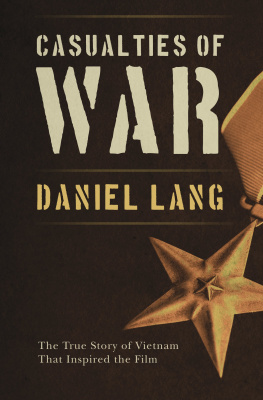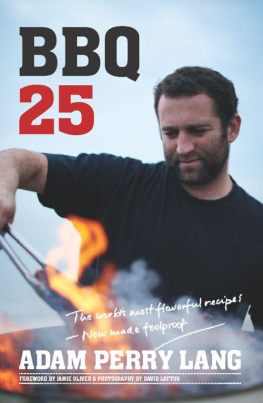Daniel Lang - Casualties of War
Here you can read online Daniel Lang - Casualties of War full text of the book (entire story) in english for free. Download pdf and epub, get meaning, cover and reviews about this ebook. year: 2014, publisher: Open Road Media, genre: Detective and thriller. Description of the work, (preface) as well as reviews are available. Best literature library LitArk.com created for fans of good reading and offers a wide selection of genres:
Romance novel
Science fiction
Adventure
Detective
Science
History
Home and family
Prose
Art
Politics
Computer
Non-fiction
Religion
Business
Children
Humor
Choose a favorite category and find really read worthwhile books. Enjoy immersion in the world of imagination, feel the emotions of the characters or learn something new for yourself, make an fascinating discovery.
- Book:Casualties of War
- Author:
- Publisher:Open Road Media
- Genre:
- Year:2014
- Rating:3 / 5
- Favourites:Add to favourites
- Your mark:
- 60
- 1
- 2
- 3
- 4
- 5
Casualties of War: summary, description and annotation
We offer to read an annotation, description, summary or preface (depends on what the author of the book "Casualties of War" wrote himself). If you haven't found the necessary information about the book — write in the comments, we will try to find it.
Casualties of War — read online for free the complete book (whole text) full work
Below is the text of the book, divided by pages. System saving the place of the last page read, allows you to conveniently read the book "Casualties of War" online for free, without having to search again every time where you left off. Put a bookmark, and you can go to the page where you finished reading at any time.
Font size:
Interval:
Bookmark:
Casualties of War
Daniel Lang

To
William Shawn
L IKE their predecessors in all wars, American veterans of the Vietnamese campaign who are coming home to civilian life have their heads filled with memories that may last the rest of their days, for, no matter how far from the front a man may have spent his time as a soldier, he will remember it as a special time, when, fleetingly, his daily existence appeared to approach the heroic. Former Private First Class Sven Erikssonas I shall call him, since to use his actual name might add to the danger he may be inhas also come back with his memories, but he has no idea what the future will do to them. Honorably discharged in April, 1968, this new war veteran, who is twenty-four and comes from a small farming community in northwestern Minnesota, isnt even sure that he would care to hold on to his recollections, if it were possible for him to control his memory. Naturally, Erikssons experiences in Vietnam were varied, and many of them impressed themselves vividly on his mind. Just seeing an Asian country, for instance, was an adventure, Eriksson says, its landscape so different from the frozen plains of his corner of Minnesota; he had never before splashed through paddy fields, he told me, or stood blinking in the sudden sunlessness of lush, entangled jungle, or wandered uncertainly through imprisoning fields of towering elephant grass. An infantryman, Eriksson saw a fair amount of action, so, if he chose, he could reminisce about strong points he helped take and fire fights in which he was pinned down, and one ambush, in particular, in which half his unit was wounded. But, as Eriksson unhesitatingly acknowledges, the fact is that when he thinks of his tour of duty in Vietnam it is always a single image that comes to his mind. The image is that of a Vietnamese peasant girl, two or three years younger than he was, whom he met, so to speak, on November 18, 1966, in a remote hamlet in the Central Highlands, a few miles west of the South China Sea. Eriksson and four other enlisted men were then on a reconnaissance patrol in the vicinity of the girls home. Eriksson considers himself hazy about the girls looks. He does remember, though, that she had a prominent gold tooth, and that her eyes, which were dark brown, could be particularly expressive. He also remembers that she was wearing dusty earrings made of bluish glass; he noticed the trinkets because they gave off a dull glint one bright afternoon when he was assigned to stand guard over her. Like most rural women, she was dressed in loose-fitting black pajamas. They obscured her figure, Eriksson says, but he has the impression that she was slender and slight, and was perhaps five feet two or three inches tall. For as long as she lived, Eriksson did not know her name. He learned it, eventually, when the girls sister identified her at court-martial proceedingsproceedings that Eriksson himself instigated and in which he served as the governments chief witness. The girls nameher actual namewas Phan Thi Mao. Eriksson never exchanged a word with her; neither spoke the others language. He knew Mao for slightly more than twenty-four hours. They were her last. The four soldiers with whom he was on patrol raped and killed her, abandoning her body in mountain brush. One of the soldiers stabbed her three times, and when defense counsel challenged Eriksson at the court-martial proceedings to describe the sound that the stabbings made, he testified, Well, Ive shot deer and Ive gutted deer. It was just like when you stick a deer with a knifesort of a thudor something like this, sir.
Eriksson talked with me at his home in (I shall say) Minneapolis, where, since leaving the Army, he has been earning his living as a cabinetmaker at a local department store. He and his wife, Kirsten, have a neat, modest apartment of three rooms, its walls decorated with paintings by Mrs. Eriksson, a Sunday artist, who was present while we talked; she is twenty-three and is employed as a receptionist in an insurance office. The two have no children. They were married four years ago, shortly after Eriksson was drafted. They had known each other since childhood, their fathers having been neighboring farmers, who both had difficulty making ends meet. This was true of many farmers in the area, Mrs. Eriksson told me, adding that most of its inhabitants were of Scandinavian background. Its a part of the country where we pride ourselves on not being demonstrative, she said. A small, pretty blonde with an alert, intelligent manner, she offered me coffee and cake the instant I set foot in the apartment. She was pleased, she told me, that I had asked to hear about the episode involving Mao. She herself had thus far been the only person with whom her husband had discussed it since returning from Vietnam, and even with her he had not gone into much detail. Itll do him good to talk to someone else, she said, her tone lively and teasing. Sitting by himself on a sofa, Eriksson smiled somewhat ruefully, a deep dimple forming in one cheek. He is a short man of fair complexion, blond and blue-eyed, and he is not voluble. In the hours we spent together, there were intervals that may have lasted as long as a minute when he sat silent, a brooding expression on his face, before resuming his account. At the start, he spoke laconically, but gradually his natural reticence thawed out, and there were timesgenerally after one of his silenceswhen he produced such a burst of talk that it seemed to cost him an effort to bring it to a halt.
At the very outset, Eriksson told me that the last thing he wished to do was discuss Maos murder in any legalistic vein. It was certainly possible to do so, as I knew for myself from having read the court record of the trials he had brought about: seven bulky volumes in the offices of the Clerk of Courts, U. S. Army Judiciary, in Falls Church, Virginia, which included Erikssons testimony against the members of the patrol; their convictions and appeals; interminable correspondence between judges and opposing counsel; and depositions concerning the character of individual defendants. Having appeared as a witness before four tribunals in Vietnam, Eriksson told me, he had had his fill of the judicial processof the dogged grillings by lawyers and the repeated strictures of judges insisting on precise answers to questions that were often vague. As far as he was concerned, Eriksson said, it had all seemed a morass of cleverness, but then, he conceded, he may well have entered the military courtroom in the Central Highlands, where the four trials were held, with unwarranted expectations, for it had been his hope that the trials would help him unravel his reactions to Maos fate. Unreasonably, he granted, he had come into court with the idea that he and the others on hand would wonder aloud, in a kind of corporate searching, how it was possible for the young girl to meet the end she did. He had imagined that he would be able to ask how it was that he alone of the patrol had come to act as he had. He had wanted to tell of the way the episode with Mao had affected him, and why it was that he had felt impelled to report the othersfour young Americans like him, each dependent on the others for survival deep in enemy territory. He had wanted to unburden himself of his doubts about whether he had done all he might have done for Mao in her travaildoubts that gnaw at him to this day. With me, he said, he trusted he would be able to go into these matters freely, but he had early discovered that in a court of law they were of little interest.
Launching into his unlegalistic account, Eriksson told me that it seemed clear to him in retrospect that he should have been prepared for Maos death. It had been preceded by any number of similar occurrences. In one form or another, he said, they took place almost daily, but he was slow, or reluctant, to perceive that they were as much a part of the war as shells and targets were. Eriksson now believes he should have foreseen that sooner or later one of these incidents was bound to strike him with special, climactic force. He had scarcely landed in Vietnam, in October, 1966, when he was made aware of these occurrences, each of them apparently impulsive and unrelated to military strategy. He told me that beatings were commonrandom, routine kicks and cuffings that he saw G.I.s administer to the Vietnamese. Occasionally, official orders were used for justifying gratuitous acts of violence. Thus, early in his tour of duty, Eriksson recalled, G.I.s in his unit were empowered to shoot any Vietnamese violating a 7 P.M . curfew, but in practice it was largely a matter of individual discretion whether a soldier chose to fire at a stray Vietnamese hurrying home a few minutes late to his hootchthe American term for the mud-and-bamboo huts in which most natives lived. Similarly, it was permissible to shoot at any Vietnamese seen running, but, as Eriksson put it, the line between walking and running could be very thin. The day after the one on which his squad was ambushed and half its members were wounded, several enemy prisoners were taken, and, in retaliation, two were summarily killed, to serve as an example. A corporal who was still enraged over the ambush tried to strangle another of the prisoners; he had knotted a poncho, nooselike, around the captives neck and was tightening it when a merciful lieutenant commanded him to desist.
Next pageFont size:
Interval:
Bookmark:
Similar books «Casualties of War»
Look at similar books to Casualties of War. We have selected literature similar in name and meaning in the hope of providing readers with more options to find new, interesting, not yet read works.
Discussion, reviews of the book Casualties of War and just readers' own opinions. Leave your comments, write what you think about the work, its meaning or the main characters. Specify what exactly you liked and what you didn't like, and why you think so.












